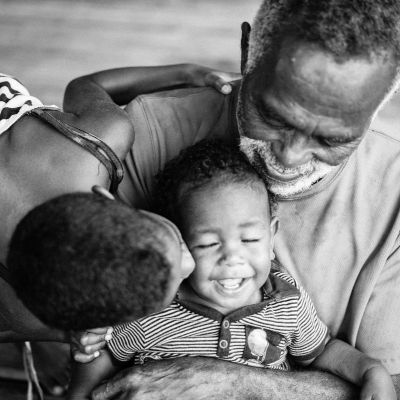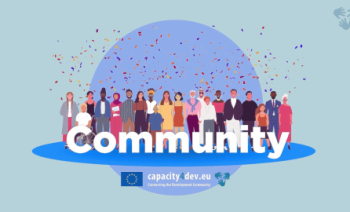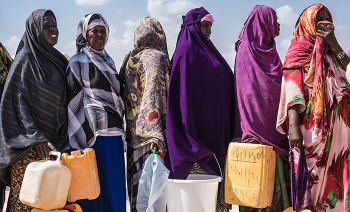EU Delegations' efforts to assist developing countries to fight the COVID-19 virus and its consequences have been a priority since the beginning of the pandemic in March 2020. The Heads of Cooperation in Kyrgyzstan and Nigeria are sharing the challenges they faced, how they responded to this unique situation, and the lessons they have learnt so far.
The EU provided a rapid response to fight the COVID-19 pandemic in Nigeria and Kyrgyzstan. In both countries, funds were quickly mobilised, and priorities were set in close collaboration with the national authorities.
The immediate response in Kyrgyzstan
As the outbreak started, the Kyrgyz Government immediately established four different working groups with Development Partners including the EU Delegation. The priority areas were: macro-financial assistance, health, food security, social protection, private sector and small and medium enterprises (SMEs). The EU allocated more than EUR 36 million to address pressing needs defined by the authorities and to assist the people most affected by this crisis.
The first infections were recorded on 18 March 2020 and have increased significantly since that date. Despite a first effective lockdown, and due to the recent deconfinement, the country has witnessed a surge in almost four times the number of infectious cases. The Head of Cooperation confirmed the EU Delegation's commitment to pursue all efforts to assist the country's response to fight the virus.
The first two Budget Support payments, a total of EUR 24.8 million, were disbursed to the Kyrgyz Treasury on the 10th of July. All in all, in 2020, EUR 30.8 million are expected to support directly the Government in ensuring payment of social protection and assistance to the increasingly poor population and newly unemployed. This also includes the payment of salaries of teachers and the increase of e-learning events for children, as schools remain closed.
Working with local partners on projects is another essential component of the EU response to COVID-19 in Kyrgyzstan. “We've had some amazing responses,” said Charlotte Adriaen, EU Head of Cooperation in Kyrgyzstan, “some of these activities have been on gender-based violence with the Spotlight Initiative, for example, tackling the increase in domestic violence during the outbreak."
Other initiatives include the provision of personal protective equipment (PPE) to support border guards and customs officers, who are the first points of contact for the many migrant workers coming from neighbouring countries, including China. Media support organisations also offered online learning events to strengthen journalists' skills on how to report about the pandemic and its consequences. Media professionals also received tools to detect and unfold potential fake news.
| Learnings from the Kyrgyz experience | ||
| Collaborate towards common objectives: "We work so much more together," explained Charlotte Adriaen. ”With the government, we continue to have meetings every week with the minister, the deputy ministers, across sectors and ministries. All development partners were invited to participate. This was very good." |
Ensure accountability and transparency: The EU Delegation had to adapt its funding mechanisms and provide a fast and efficient response to the pandemic. This required strong communication channels among partners and also rigorous transparency. “Transparency is key," said Charlotte Adriaen, “because this is a time where you can go very quickly and forget important elements, which then become an issue later on. We always remembered to be accountable and transparent even when we had to move very fast." Together with the World Bank and the Asian Development Bank, the EU Delegation is looking into monitoring the budget support operations. |
Involve more civil society organisations: The downside of the rapid response offered by the Development Partners and the Delegation was the lack of time and space available to include other civil society organisations. EU funded partners were involved in the implementation, but less in the policy dialogue with the authorities. “We have to improve this in the future, and find a way to include more organisation from the civil society and reach out to all sectors involved in the development process," said Charlotte Adriaen. |
In the following video, Charlotte Adriaen EUD Kyrgyzstan Head of Cooperation, highlights key challenges, the responses her Delegation offered to the pandemic and the lessons learnt so far.
Fast and collaborative measures in Nigeria
By the end of March, the COVID-19 response strategy of the EU Delegation to Nigeria was ready. It was finalised just a few days after the health crisis broke in the country. The United Nations (UN), and its agencies were considered as the best possible partners to work with the EU to support a large amount of the population.
This collaboration resulted in the creation of a basket fund, to which the EU contributed with an amount of EUR 50 million, called the 'One UN Response Plan to COVID-19 in Nigeria'. In only five days, the EU Delegation produced a draft action documents based on the government COVID-19 national response, which immediately got a positive reply from DEVCO Headquarters in Brussels.
“This was extremely fast," said Kurt Cornelis, EU Head of Cooperation in Nigeria, “on the sixth of May, we signed the contribution agreement with the UN, and five days later, the board approved the first projects of the Basket Fund."
The Delegation is also covering the 15 member states of the Economic Community of West African States (ECOWAS). It has, therefore, also mobilised EUR 4 million to act on the health crisis at the regional level.
To further address the needs of the most vulnerable, additional funding to the COVID-19 response was allocated by EU implementing partners. First aid kit with personal protective equipment (PPE) and masks were distributed to the population via these actors. On a larger scale, in June 2020, an important shipment secured through the EU-UN collaboration, delivered oxygen concentrators, test kits, digital no-touch thermometers, additional PPE, laboratory supplies and emergency health kits to the Government of Nigeria. In total EUR 20 million of medical supplies and equipment were brought into the country.
In the following video, Kurt Cornelis EUD Nigeria Head of Cooperation, highlights key challenges, the responses his Delegation offered to the pandemic and the lessons learnt so far.
| Learnings from the Nigerian experience | ||
| Collaborate for a nation-wide impact: For this large and highly populated country, the need to build a partnership with the UN and its agencies was an important achievement. “Our good collaboration with the UN agencies, the UN resident coordinator, and the UNDP which is managing the Basket Fund, helped us a lot,” said Kurt Cornelis. This allowed the EU Delegation to have quick access to the Presidential Task Force, which is leading the national response to the health crisis. It also gave access to the Nigerian Centre for Disease Control, which is technically responsible for delivering aid. |
Support a national strategy: The financial resources made available by the EU should support a nationally owned policy. In Nigeria, it was mobilised for the National Multi-Sectoral COVID-19 Pandemic Response Strategy. Key government agencies are members of the Board of the Basket Fund and have a big say in the allocation of resources to priority projects that are an integral part of the response to the pandemic. |
Address the indirect consequences: The EU Delegation is part of a group of Development Partners; preparing discussion papers on socio-economic topics to analyse and offer a response, in the medium term, on the indirect consequences of the crisis. Coordination structures have been created between donors to participate in this process. The papers will be shared with the ministries in charge of the different topics. |
Collaborative work with national authorities to achieve common objectives is vital according to the Heads of Cooperation of the EU Delegations to Kyrgyzstan and Nigeria. Their experiences are just two examples of EU efforts to build partnerships in support of national agendas, to achieve a broader impact and fight the COVID-19 pandemic.
Credit: Videos © Capacity4dev | Photo © by KB Mpofu / ILO






Log in with your EU Login account to post or comment on the platform.